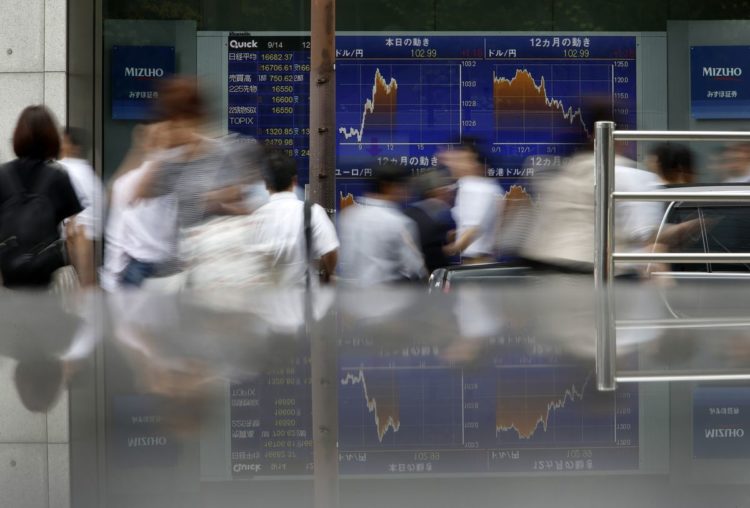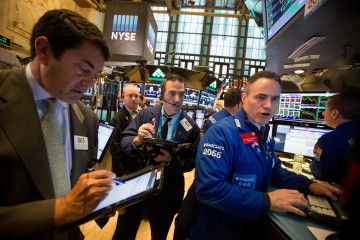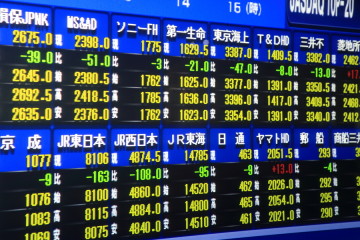Asian Futures Signal Stock Retreat as Trump Trade Loses Momentum

published Dec 1st 2016, 5:45 pm, by Emma O’Brien and Choong En Han
(Bloomberg) —
The Trump rally is running out of steam as fresh concerns over the U.S. outlook and stability in Europe weigh on the dollar and global equities.
The Bloomberg Dollar Spot Index is headed for its first weekly drop since Donald Trump’s election to the presidency fueled bets on increased fiscal stimulus and a subsequent bounce in U.S. growth. Australian shares opened lower and futures on other indexes in the region signaled declines after technology-stock losses dragged the S&P 500 Index down a second day. The euro and yen maintained gains against the greenback amid caution ahead of key American jobs data, Italy’s weekend referendum and Austria’s presidential vote. Australian bonds extended their slide with crude oil above $51 a barrel.
Developed-market stocks are also on track for their first weekly retreat since the U.S. vote, amid a let up in support for so-called reflation trades, which gained ground as Trump’s victory burnished the U.S. economic outlook and helped odds on an interest-rate hike this month to 100 percent. Billionaire bond fund manager Bill Gross said investors betting on a Trump windfall are misguided, with any benefits from increased stimulus likely to be temporary. Italy’s referendum on reducing the power of the Senate is also weighing on risk sentiment, given a win for ‘No’ could result in the government’s ouster.
“Markets have rallied pretty strongly and we had three fantastic weeks but buying pressure certainly looks exhausted,” James Woods, global investment analyst at Rivkin Securities in Sydney said by phone. “We will see some corrective declines and profit taking, and from a technical perspective, allowing momentum indicators to unwind before gains can be sustained.”
As well as the U.S. nonfarm payrolls report, Friday brings an update on South Korean gross domestic product and Japan’s monetary base. Australia reports on retail sales, and Thailand issues figures on foreign reserves.
Stocks
Technology and property shares led Australia’s S&P/ASX 200 Index down 0.1 percent as of 8:44 a.m. Tokyo time, swelling the gauge’s drop in the week to 0.3 percent as New Zealand’s S&P/NZX 50 Index added 0.1 percent. Nikkei 225 Stock Average futures were bid up 0.2 percent to 18,440 in the Osaka pre-market, while yen-denominated contracts on the measure traded in Chicago were little changed after sinking 0.9 percent. Futures on equity gauges South Korea and Hong Kong fell at least 0.2 percent with contracts on the FTSE China A50 Index. S&P 500 Index futures dropped 0.1 percent after the underlying benchmark lost 0.4 percent Thursday, retreating for the third time in four days after ending last week at a record high. Technology shares extended their declines since the American election, with the Nasdaq Composite Index down 1.4 percent Thursday amid concern over Trump’s trade policy and as investors rotated out of one of the year’s most favored investment sectors. The Philadelphia Semiconductor Index dropped 4.9 percent last session, the most since Britain voted to leave the European Union.
Currencies
The yen edged up another 0.1 percent to 114 per dollar, after gaining 0.3 percent last session, trimming its drop in the week to 0.6 percent. The euro was steady at $1.0664 after climbing 0.7 percent. The MACD, or short-term moving average line, on Bloomberg’s dollar index is poised to fall below the so-called signal line as the gauge heads for its first weekly drop since vote. That indicates bears may be taking control of the trade unless a strong jobs report revives the dollar’s rally.
Bonds
Australian government debt due in a decade yielded 2.88 percent, up another 10 basis points Friday, to their highest level on a closing basis in almost a year, while yields on similar maturity New Zealand notes rose by eight basis points to 3.30 percent. Ten-year Treasury yields increased by seven basis points to 2.45 percent Thursday, their highest close since July 2015. Economists predict an 180,000-worker increase in November payrolls, after they climbed by 161,000 in October. The Bloomberg Barclays Global Aggregate Total Return Index of bonds fell 4 percent in November, its biggest decline since index was started in 1990.
–With assistance from Lu Wang. To contact the reporters on this story: Emma O’Brien in Wellington at eobrien6@bloomberg.net ;Choong En Han in Kuala Lumpur at echoong6@bloomberg.net To contact the editors responsible for this story: Emma O’Brien at eobrien6@bloomberg.net Andreea Papuc
copyright
© 2016 Bloomberg L.P







No Comment